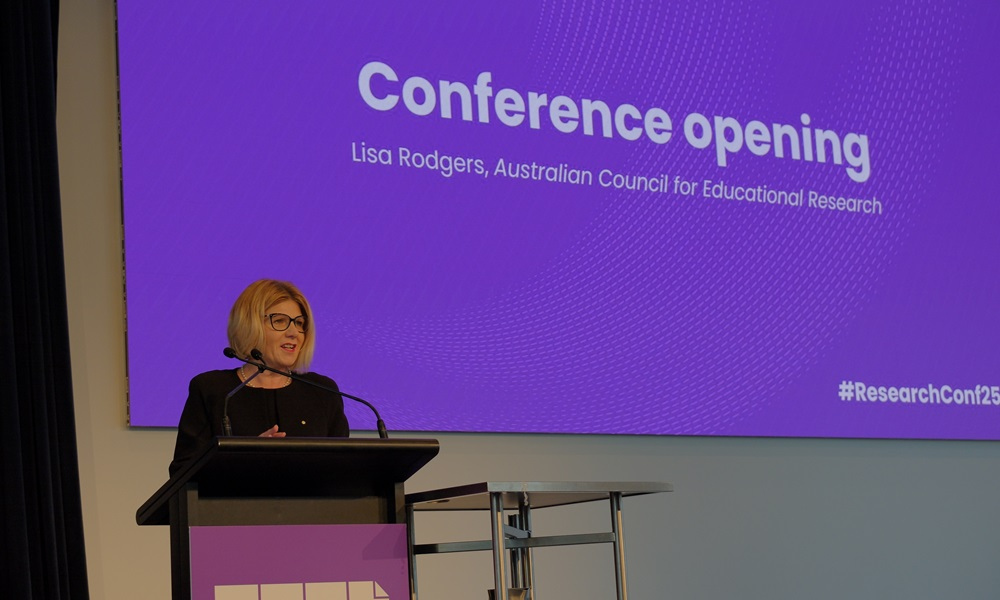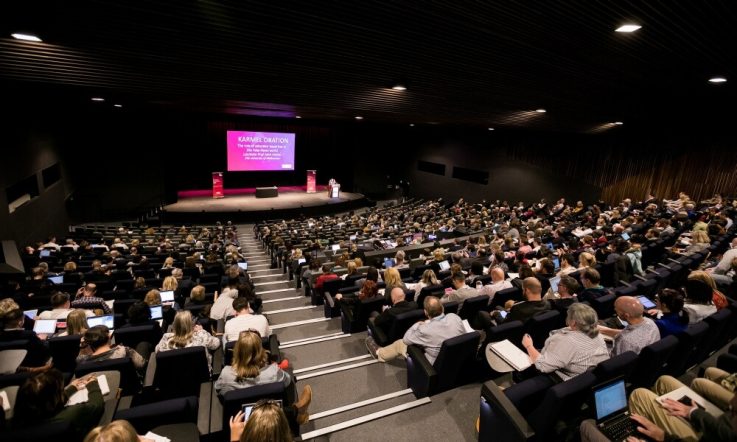It’s the opening day of Research Conference 2025, and educators are coming together in Melbourne to hear local and international experts explore how we can transform learning systems to enable holistic growth for all students.
The 2-day conference is hosted by the Australian Council for Educational Research (ACER) and will this year feature 4 keynote addresses, 4 panel sessions, poster presentations and many concurrent sessions for delegates to choose from. The theme of the conference is transforming learning systems.
After a Welcome to Country, ACER Chief Executive Lisa Rodgers PSM welcomed delegates and delivered the Conference opening address. She began with a tribute to the work and contribution of former CEO, Professor Geoff Masters AO, and addressed the complexity of challenges facing education, highlighting the crucial role of educators alongside systems and policymakers.
‘Educators I’ve spoken to tell me it’s one of the few jobs where you’re never finished,’ she said. ‘It might not have the hours of an ICU doctor or a surgeon or indeed, politicians, who endure parliamentary sittings well into the morning. But it doesn’t have the opportunity to hand it over to another professional, who can take it from here at the end of a long shift. There’s always more that can be done – that plan for that class, a new consideration in regard to that student’s learning goals and how much progress we can attain.’
She added that system transformation only happens if we partner with the profession.
‘As we navigate through individualised learning plans, complex behaviour management and the ever-evolving expectations that communities have on schools, it’s absolutely crucial to remember that we are all in this together, working together towards a common goal. And that is to ensure that students make year-on-year improvement and experience success and outcomes.’
Attendees then tuned into the first keynote session of the Conference, delivered by Professor Masters. His session, Enabling more holistic, growth-oriented, student-centred teaching and learning, explored what it would take to redesign the machinery of schooling to enable more holistic, growth-oriented, student-centred teaching and learning.
After a networking morning tea break, delegates moved into concurrent sessions to hear from Dr Sheridan Dudley from UNSW, Professor Toby Greany from the University of Nottingham, or Professor Pauline Taylor-Guy from ACER.
The first panel session of the Conference brought together Professor Martin Westwell from the Department of Education South Australia, Jodee Wilson from Department for Education, Children and Young People Tasmania, Karen Weston from the Department of Education Northern Territory and Tim Bullard, Australian Institute for Teaching and School Leadership (AITSL). Moderated by Anthony Mackay AM, National Center on Education and the Economy (NCEE), the panel explored the opportunities and challenges in leading transformative system change in smaller states.
The second Keynote session for the day will be delivered by Professor David Hopkins from the University of Greater Manchester, whose session is titled Unleashing greatness – a strategy for school improvement. The session title is shared with the title of his latest book, and Teacher caught up with Professor Hopkins ahead of his appearance at Research Conference to talk about one of the 8 steps in his strategy, instructional leadership. You can listen to our podcast episode with Professor Hopkins here.
The final session of the day is a panel discussion with educators from the Mathematical Association of Victoria (MAV) and a school leader, who will together reflect on the process of embedding school-wide change, related to primary mathematics education.
Day 2 of the Conference will see keynote addresses from Professor Bill Lucas and Dr Tracey Burns, and panel sessions looking at digital and artificial intelligence in education and roadmapping for the future. There will also be sessions on AI-enhanced assessment, the integration of essential skills into the curriculum, and enhancing student wellbeing.
To follow along, keep up to date with us on LinkedIn and X as we continue to share insights from the second and final day of the Conference.



